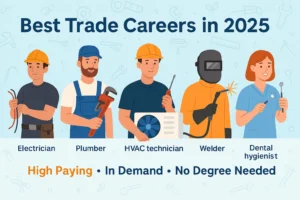With student debt rising and job markets shifting fast, more students (and even adults looking to switch careers) are turning to trade schools.
And for good reason: many trades are incredibly high-paying, can be learned in under a year, and—let’s be real—don’t leave you drowning in loans.
In my opinion, if you enjoy hands-on work, like solving real problems, and want a career that can’t easily be outsourced or replaced by AI… trades are a smart bet.
But not all trades are created equal. Some offer six-figure potential. Others give you job security that even a degree doesn’t guarantee. So let’s break down the best trades to go to school for in 2025—backed by real data, student stories, and some things most people overlook.
Why Choose a Trade School Instead of College?
Let’s get this straight—college isn’t bad, but it’s not for everyone. Trade schools (also called vocational or technical schools) focus on practical, job-ready skills you can use right away. We’re talking electricians, HVAC techs, welders, dental hygienists, and so on.
🔗 Here’s a full guide on what trade school really is if you’re new to the idea.
So why are so many students switching?
Trade School Pros:
- Shorter programs: Most take 6 months to 2 years max.
- Much cheaper: Tuition is often 60–80% lower than traditional college.
- Direct career paths: You train for one thing—and you’re job-ready.
- High demand: Skilled trades can’t be outsourced or automated easily.
Real Insight (from Reddit):
“I spent 2 years in college, dropped out, and now I’m making more as a union electrician than my friends with degrees. Plus no debt.”
—u/bluecollarcraig source
In my opinion, this is what most parents miss—stability and solid income can come without a 4-year degree. It’s time we normalize that.
Not sure whether a trade school, community college, or specialized program is the right fit? Our school selection guide walks you through every option to help you make the smartest educational choice.
What Are the Best Trade Jobs to Learn in 2025?
If you’re wondering which trade is truly worth going to school for—here’s your cheat sheet.
These jobs are in high demand, pay well, and don’t require a 4-year degree. Whether you like tinkering with machines or fixing systems that actually matter, here’s what’s hot in 2025.
Quick Comparison Table
| Trade | Median Salary | Training Time | Growth Outlook |
|---|---|---|---|
| Electrician | $60,240 | ~1 year + apprenticeship | 7% (BLS) |
| HVAC Technician | $48,630 | 6–12 months | 5% |
| Elevator Installer | $85,000+ | 4 years (apprenticeship) | 3% |
| Plumber | $59,880 | 1–2 years + license | 4% |
| Welder | $47,540 | 6 months – 1 year | 3% |
| Aircraft Mechanic | $70,740 | 18–24 months | 4% |
| Dental Hygienist | $81,400 | 2-year associate degree | 7% |
Source: Bureau of Labor Statistics
1. Electrician
- Salary: ~$60K median, but can go up to $100K+ with experience
- Training Time: ~1 year of school + 4-year apprenticeship
- Job Outlook: 7% growth (faster than average)
- Best for: People who love working with their hands and solving real-world problems. If you’re good with logic, systems, and don’t mind crawling into tight spaces occasionally, this one’s for you.
Reddit user in r/electricians: “I got my license at 23 and cleared 6 figures by 27—no college debt, just time spent learning on the job.”
2. Plumber
- Salary: ~$59,000 median; can reach $90K+
- Training Time: 1–2 years + certification/license
- Job Outlook: 4% growth
- Best for: Folks who don’t mind getting their hands dirty and want stable, recession-proof work. Plumbing is one of those trades that never goes out of style.
According to BestColleges, plumbing consistently ranks in the top 10 trades for job security and pay.
3. HVAC Technician
- Salary: ~$48,630
- Training Time: 6–12 months technical school
- Job Outlook: 5% growth
- Best for: Problem solvers who enjoy mechanical work, diagnosing systems, and don’t mind occasional emergency calls during summer or winter.
A user on Quora shared: “HVAC was my second career. I trained at 35, and now earn more than my desk job ever paid me.”
4. Elevator Installer and Repairer
- Salary: $85,000+
- Training Time: 4-year union apprenticeship
- Job Outlook: 3% growth
- Best for: Tech-minded folks who love mechanics but aren’t afraid of heights. Physically demanding, but extremely well-paid and union-backed.
According to Indeed, this trade ranks among the highest-paying in the entire sector.
5. Welder
- Salary: ~$47,540 (higher for underwater or pipe welders)
- Training Time: 6–12 months certificate
- Job Outlook: 3%
- Best for: Those who love working with fire, metal, and precision. Welding is used in everything from shipbuilding to NASCAR.
Specialized welding (like aerospace or underwater) can push salaries over $100K, per Weld-Ed.org.
6. Aircraft Mechanic
- Salary: $70,740
- Training Time: ~2 years at FAA-certified schools
- Job Outlook: 4%
- Best for: Detail-oriented folks who love airplanes and don’t mind climbing around huge engines. FAA licensure required.
According to the FAA, the aviation maintenance industry is short tens of thousands of certified mechanics by 2030.
7. Dental Hygienist
- Salary: $81,400
- Training Time: 2-year associate degree
- Job Outlook: 7%
- Best for: Those who like helping people and don’t mind working in close quarters. A great option for people looking for a well-paid, clean, and flexible healthcare trade job.
Check with your local community college—most offer dental hygiene programs with strong placement rates.
Which Trades Can Make $100K or More?
Let’s cut to the chase: yes, you can make over $100K in a skilled trade—but it doesn’t happen overnight. Most high-paying trades reward you as you gain experience, licenses, and specialization.
Top-Earning Trades (with scaling potential):
Elevator Installer/Repairer
Median salary: ~$97K
With union membership + overtime? You’re easily past $120K.
Nuclear Technician
Often requires an associate degree, but salaries start around $80K and scale quickly—especially in power plants or military settings.
Electrical Lineman
These pros work on high-voltage lines, often outdoors. Dangerous? A bit. High-paying? Absolutely. Some linemen make $100K+ with just a few years in the field, especially with storm callouts and hazard bonuses.
Plumbers, Pipefitters, Steamfitters (Unionized)
Licensing and union contracts can push your earnings past six figures—especially in large cities like NYC or LA.
Reddit Real Talk:
“You hit 6 figures as a union plumber in NYC by year 5. Easily. It’s all about licensing + overtime.” — r/SkilledTrades
Union vs Non-Union Pay Differences
Union trades typically offer:
- Better hourly rates
- Guaranteed wage increases
- Health insurance + retirement
- Access to more complex, high-paying jobs
Non-union trades give more flexibility and faster entry—but the pay ceiling is usually lower unless you start your own business.
In my opinion… if you’re in it for long-term earnings and benefits, union trades win. But if you’re entrepreneurial and want freedom? Non-union might fit better.
Which Trades Can Make $100K or More?
Not all trade jobs are created equal. Some cap out early, while others scale like crazy as you gain experience, licenses, and special skills. If you’re aiming for the $100K+ mark, here are a few trades where that goal isn’t just possible—it’s common:
Top Trades That Can Hit Six Figures
- Elevator Installers & Repairers
These folks work with high-risk, high-tech systems. According to Indeed, top elevator technicians make over $100K/year, especially in unionized roles. - Nuclear Power Reactor Operators
Not your everyday trade, but with some training and licensing, this job pays serious money. Plus, you get to say you operate nuclear machinery—which sounds pretty cool, right? - Electric Linemen (Power Line Technicians)
Dangerous? Yes. Rewarding? Absolutely. Linemen who work storms, overtime, or are part of emergency crews can easily break the 6-figure barrier, especially in coastal or rural utility zones. - Union Plumbers, Electricians & Pipefitters
This is where things scale with time. A non-union apprentice might start at $20/hour, but a licensed union plumber in NYC with 5 years in? They’re pulling in 6 figures.
Real Reddit Experience
“You hit 6 figures as a union plumber in NYC by year 5. Easily. It’s all about licensing + overtime.”
— r/SkilledTrades
Union vs. Non-Union Pay
Here’s where people get tripped up.
| Factor | Union Workers | Non-Union Workers |
|---|---|---|
| Starting Pay | Often lower (apprentice wages) | Slightly higher at entry level |
| Benefits | Healthcare, retirement, PTO included | Varies by employer |
| Raises | Structured yearly raises | Based on performance or budget |
| Job Security | Strong due to contracts | Can be at-will |
| Long-Term Pay | Often higher due to negotiated rates | May plateau unless you specialize |
In my opinion, if you’re in it for the long haul, unions usually win—especially in high-cost cities. But if you want faster cash flow early on, non-union might feel more flexible.
Easy Trades to Learn That Still Pay Well
These are great if you’re looking for a fast career switch, a side hustle, or a hands-on job that doesn’t require sitting in a lecture hall.
In fact, many of these trades have short-term programs (under a year) or can be learned entirely on the job with just a certification.
Here are some examples worth considering:
| Trade | Training Length | Avg. Pay (2024–25) |
|---|---|---|
| Welding | 6–9 months | $47,000–$66,000/year |
| Forklift Operator | 1–2 weeks + cert | $36,000–$52,000/year |
| Carpentry | 6–12 months (or apprenticeship) | $48,000–$60,000/year |
| Medical Billing/Coding | 4–9 months (online cert) | $45,000–$58,000/year |
One Reddit user on r/SkilledTrades mentioned how they started as a warehouse worker and became a forklift trainer within 6 months—without any prior schooling. They just paid for the certification and got promoted quickly.
Certification vs On-the-Job Training
- Certification: Some trades like welding or medical billing require basic licensing or passing an industry exam.
- On-the-Job: Others, like carpentry or painting, may start with an apprenticeship or entry-level work that teaches you as you go.
In my opinion, these types of trades are perfect for people who want to earn while they learn.
How to Choose the Right Trade Course for You
I’ve seen people jump into HVAC or welding just for the paycheck, only to burn out six months in.
So before you sign up for any trade program, take 10 minutes to go through this checklist. It’ll save you time, money, and a ton of frustration later.
✅ 1. Personal Interests
Ask yourself: Do I enjoy fixing, building, or working with my hands?
Some trades are more physical and hands-on (like plumbing), while others are more technical (like electrical or aircraft systems). In my opinion, this should be your first filter.
✅ 2. Physical Demands
Can I handle long hours on my feet, lifting heavy tools, or working outdoors?
Electricians and construction managers spend hours in unpredictable environments. Meanwhile, dental hygienists or ultrasound techs work indoors in more controlled spaces.
✅ 3. Salary Expectations
What’s my goal? $40k starting out? $100k+ long-term?
Here’s what most people miss: Some lower-paying trades offer better work-life balance or faster entry. Think about what matters more to you—money, time, or freedom?
✅ 4. Licensing & Training Requirements
Does this trade require a state license, apprenticeship, or certification?
For example, elevator repairers often need a license and 4 years of training. HVAC techs? Many can get started with a short certificate.
✅ 5. Local Job Demand
Is this trade in demand where I live?
No point training to be a marine mechanic if you’re landlocked. Visit your local job board or use tools like BLS.gov to check demand near you.
Downloadable Checklist
I’d recommend keeping this checklist handy as you explore options. You can print it or save it to your Google Drive:
👉 Download the Trade Career Fit Checklist (Google Doc)
👉 PDF Version
I’d honestly recommend looking into trade careers even before committing to a four-year college. You might be surprised at how fast you can get certified—and how much you can earn.
👉 Here’s what most people miss: Trade school isn’t about settling. It’s about choosing a path that fits your strengths, pays well, and stays in demand.

Nawab, an educator with a decade of K-12 teaching, holds an English honors graduate degree and a diploma in elementary education. He has also been blogging for five years, sharing insights for educators and parents.

